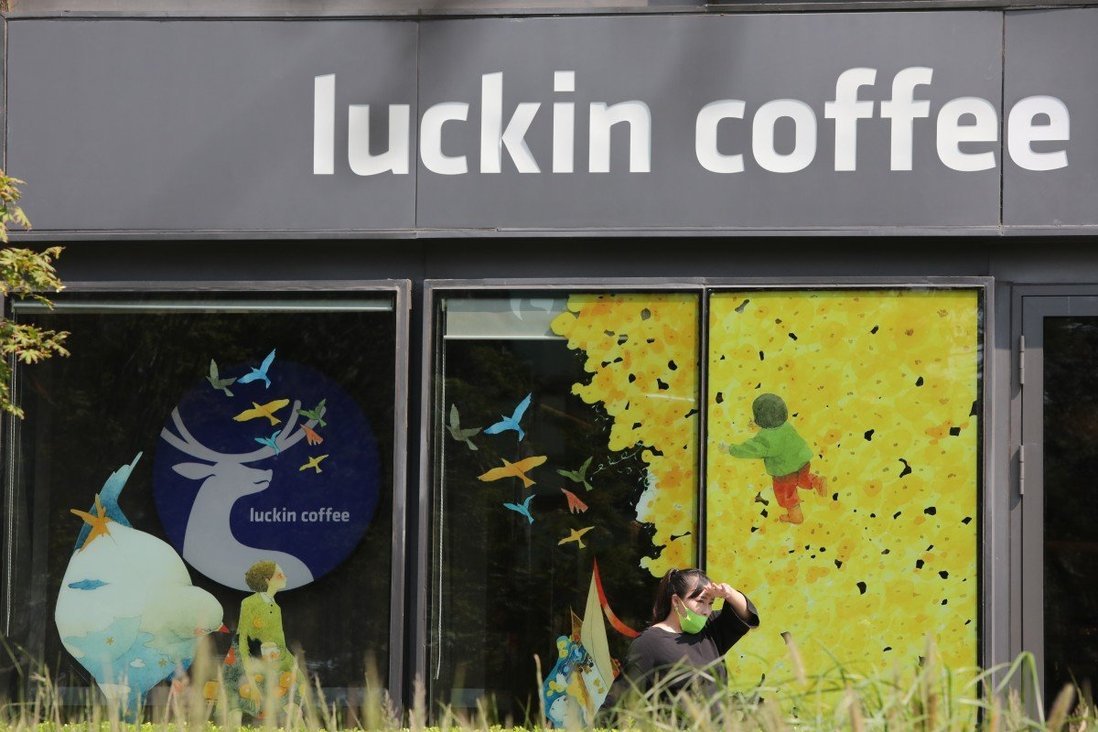‘Bankrupt’ Luckin Coffee’s stirring tale of survival
Luckin Coffee outlet is pictured in downtown Beijing on September 1, 2021. Photo: Simon Song
Hedge funds help coffee chain overcome 2020 accounting scandal with debt restructuring pact
By Cheryl Heng (South China Morning Post)
Luckin has seen substantial growth in revenue this year after sales surged 33 per cent to US$618 million in 2020
Chinese coffee chain signs binding pact to fully repay bondholders over five years and offers to settle a slew of class-action lawsuits in the US
Not many would have given Luckin Coffee a chance to survive its accounting fraud. Yet, since falling into provisional liquidation in July 2020, the firm has opened more stores, is getting a capital injection to repay creditors and looking to exit bankruptcy protection.
On Tuesday, the Chinese Starbucks wannabe set another milestone by signing restructur- ing terms that could make bondholders almost whole and settle US class-action lawsuits. Its two pre-initial public offering financial backers are pumping US$250 million in to help the firm move on to its next hurdles.
All that is happening as the coffee chain added 89 self-operated stores in the first half this year to increase the total to 4,018, while its partnership stores grew by 367 to 1,241.
The firm saw “substantial growth in net revenue”, aided by a jump in customers, its provisional liquidators said earlier this month. Last year, sales grew 33 per cent to US$618 million.
“Data and experience accumulated during the past few years’ business expansion, as well as its tech prowess, make Luckin Coffee a company worth rescuing,” said Ivan Platonov, a research manager at EqualOcean, a Beijing-based tech research firm. “That US$250 million is important but perhaps will not be the last deal of this type.”
Luckin Coffee imploded in April 2020, less than a year after its Nasdaq listing, following revelations it inflated sales and understated costs to boost its performance metrics. The scandal wiped out more than US$12 billion in stock value, and crashed its bonds to as low as 20 US cents on the dollar, prompting a slew of lawsuits.
Hong Kong and US hedge funds, who have since swept up 94 per cent of the US$460 million January 2025 convertible bonds, from 59 per cent in March, presumably at distressed levels, are now betting on Luckin Coffee’s survival.
The funds include investment vehicles managed by Linden Advisors, which is principally owned by Hong Kong and US citizen Joe Wong Siu-min, Hong Kong-based Long Corridor Asset Management founded by James Tu Xinjun, Oasis Capital Partners and Davidson Kempner Capital Management.
They are members of a committee of noteholders, who have now signed a binding agreement to support Luckin Coffee’s restructuring to eventually take it out of US Chapter 15 bankruptcy protection.
Wong, whose firm manages about US$26.2 billion of discretionary funds with offices in New York and Hong Kong, did not reply to requests for comment. While Tu confirmed Long Corridor is represented in the committee, he declined to comment to the Post, citing confidentiality restrictions.
Luckin Coffee offered to issue a combination of new one-year and five-year senior notes paying 9 per cent coupon annually to noteholders, among some of the repayment options for the defaulted bonds. The noteholders stand to get back as much as 96 per cent in recovery, Luckin Coffee said in June.
The company’s depositary shares, which now trade over the counter since delisting in June 2020, jumped to US$15.05 after the announcements on Tuesday. They have risen from as low as US$5.69 in February. Its convertible bonds fetched about 91 cents on the dollar, reflecting near-certain repayment.
Centurium Capital and Joy Capital, who were among Luckin Coffee’s early investors before it went public in New York in May 2019, are ploughing US$250 million of rescue capital to keep the firm alive in exchange for more preferred or priority shares inthecoffeechain.
The Beijing-based private equity firm owned by David Li Hui declined to comment. It said in April it was confident of Luckin Coffee’s business model and its long-term growth potential.
The Xiamen, Fujian-based coffee chain will certainly face more hurdles. Much of its cash, about 4.8 billion yuan (HK$5.7 billion), is located on the mainland. Efforts to extract the cash to fund its restructuring will not succeed without the nod from the State Administration of Foreign Exchange, the gatekeeper of capital flows.
Luckin Coffee, meanwhile, has been locking horns with US-based funds over the April 2020 accounting fraud, and several class-action lawsuits from shareholders are pending, according to US court documents. The company has offered US$187.5 million to settle the cases, according to Tuesday’s announcement.

